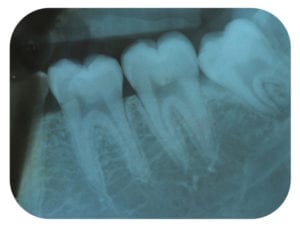 When teeth break through the gums, most of them push their way through without problems. However, when a space is too small for the tooth to make its way through, it either pushes other teeth out of the way or it becomes impacted. It most frequently happens when wisdom teeth push through during late adolescence or early adulthood. As people mature, their jaw may not have enough room to accommodate all their adult teeth.
When teeth break through the gums, most of them push their way through without problems. However, when a space is too small for the tooth to make its way through, it either pushes other teeth out of the way or it becomes impacted. It most frequently happens when wisdom teeth push through during late adolescence or early adulthood. As people mature, their jaw may not have enough room to accommodate all their adult teeth.
Impacted teeth can cause painful infections that left untreated can enter the bloodstream and even spread to the brain.
Signs You Have an Impacted Tooth
When a tooth is impacted, it causes a throbbing or aching pain that doesn’t go away. Pain starts in the back of the mouth and radiates out, getting worse the longer it goes on.
Impacted teeth cause problems with your gums. They may look red and swollen and feel tender when you brush or chew. If you floss, they may bleed or become extremely painful. Your jaw also may begin to swell, eventually becoming so painful it’s hard to open your mouth.
Impacted teeth cause infection. The lymph nodes in your neck might feel swollen and tender as they try to filter out bacteria. You might have bad breath from seeping infection or headaches that radiate out from your jaw.
Tests Your Dentist Will Run
X-rays will show your dentist or oral surgeon what’s going on below the surface. If teeth are impacted, your dentist will evaluate the amount of infection and talk to you about the best treatment plan.
Treatment Options and Risks
If your impaction stays untreated or you wait too long to follow your dentist’s advice, the tooth can push against the teeth around them until they become loose. Impactions can also turn from an infection into an abscess.
For most patients, tooth extraction is an outpatient procedure. After the dentist removes your tooth, you may have some pain, swelling and a small amount of bleeding. Your dentist may prescribe medication to fight infection and control pain. Most patients recover in a week or less.
If you feel pain in your mouth and gums, see a dentist right away. Contact the staff at OMSNashville to find out how we can help.
The information and content on our website should not be used as a substitute for medical treatment or advice from your doctor.









